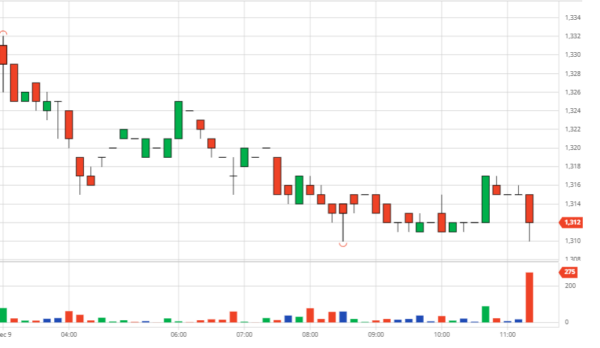Disappointed by the disagreement about the new financing package that made USDX rebound and US stocks fell, which had a negative impact on most derivative commodity markets …

Robusta London T1 / 2021 chart session on December 9, 2020
KAt the end of the session, Robusta coffee prices on ICE Europe – London dropped for the fourth consecutive session. January spot futures fell 14 USD, down 1,312 USD / ton and futures for March delivery dropped 11 more, to 1,334 USD / ton, the significant reductions. Volume of transactions in normal.
Similarly, Arabica coffee prices on the ICE US – New York floor reversed and decreased. Futures for delivery in March fell 2.2 cents, down 117.05 cents / lb and futures for May delivery fell 2.15 cents, to 118.8 cents / lb, the decline very significantly. Trading volume below average.
The price of coffee beans in the Central Highlands provinces decreased by 100-200 VND, down fluctuating in the frame of 31,400 – 31,800 VND / kg.
Export Robusta coffee price type 2, 5% broken black, stood at 1,414 USD / ton, FOB – HCM, with the difference plus 60-80 USD / ton in term of March in London.
Reais copper fell 0.81%, to stand at $ 1 = 5,1730 Reais after the Monetary Commission (Copom) and Bank of Brazil (BC) decided to maintain interest rates at 2.00% / year. with the expectation of holding the target under long-term inflation.
Meanwhile, the disagreement in the US Congress about the new funding package leading to speculation that there will be no economic stimulus before Christmas made USDX rebound and US stocks fell again. This is also the main reason that speculation on derivative commodities continues to stand outside to wait and listen more.
Coffee prices on both futures continued to weaken, but the main impact of supply – demand, when Brazil exports increased and Vietnam is promoting the harvest of a new crop, in the context of favorable weather. more beneficial for coffee producing countries.
However, the market is also cautious about the forecast that Brazil’s upcoming crop will decline dramatically and the reported increase in the number of covid-19 infection in the world causes the global demand for coffee to decline. The drop is inevitable.
English (giacaphe.com)
